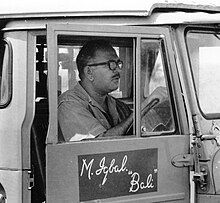Bali Mauladad
Bali Mauladad | |
|---|---|
 | |
| Born | Muhammad Iqbal Mauladad 30 August 1926 Nairobi, Kenya |
| Died | 18 February 1970 (aged 43)[1] Aga Khan University Hospital, Nairobi, Kenya |
| Occupation | Professional game hunter |
| Spouse | Riaz Mauladad |
| Children | 5 |



Muhammad Iqbal Mauladad (1926–1970), nicknamed Bali, was a big game hunter in Kenya.
He was born into a rich and influential family of Kenyan Asians but, rather than joining the family engineering business, he became a professional hunter, leading parties on safari to hunt large animals, especially elephant. He was the first Muslim to be recognised as a white hunter and won the Shaw & Hunter trophy for best professional guide in 1966. He also competed in the Safari Rally, placing fourth in 1961. He died in 1970, following severe goring by a Cape buffalo.
Early life
[edit]He came from a rich family as his father, Chaudry Mauladad, was a successful civil engineer in East Africa.[3] He attended the Government Indian School in Nairobi and his father then taught him construction and contracting.[4] But, from the age of ten, he had learned to shoot a rifle and so, rather than join the family business like his brother Basheer, he chose to be a professional hunter in Kenya where he was born and spent his life.[3][4][5]
Career
[edit]He joined the well-established business, Safariland, after World War Two and was successful as a big game hunter, leading rich clients on safari and killing many game animals, especially elephant.[3][6]: 179 The hunters he guided included the King and Queen of Nepal and the Governor of Colorado, Teller Ammons.[7] British shooting-brakes were converted into safari cars for these shooting parties and he designed a lightweight rifle rack for these which was made in Naroibi for him and most of the other hunters by the gunsmiths Wali Mohamed & Co.[6]: 175
Though he was from a Kenyan Asian background, he was admitted to the East African Professional Hunter's Association which was normally only open to white hunters.[3][8] He was the first Muslim to be recognised in this way.[2] His closest colleague in the hunting business was another Asian, Ikram Hassan, whose business was African Hunting Safaris, and they hunted elephant together in the coastal regions of Kenya.[6]
He was a large, powerful man, weighing 250 pounds (110 kg) and standing over six feet (1.8 m) in his prime.[5] He had a distinctive moustache and a warm, extrovert manner which made him popular with clients and the other hunters.[9] He liked joking and jazz, racehorses and rifles, fast cars and food, women and whisky – his favourite was Johnny Walker Black Label.[6]: 235 Besides hunting, he was also an enthusiastic cricket player and rally driver.[3] He took part in the Safari Rally four times.[3] In 1961, he and Lee M. Talbot placed fourth, driving a Humber Super Snipe over 3,000 miles (4,800 km).[10][11] He also took part in the 1956 production of the movie Bhowani Junction on location in Lahore.[12]
He was awarded the prestigious Shaw & Hunter prize for leading a client, Donald Harris, to the finest trophy of the year on 4 October 1966.[2][13][14] This was an Oribi antelope whose horns measured 7 inches (18 cm), beating the previous world record of 6+1⁄4 inches (16 cm).[2][13] The small size of the antelope was incongruous because Bali was himself known for his prowess in hunting elephants with enormous ivory tusks of up to 152 pounds (69 kg).[2][13]
Hunting was dangerous as he was once mauled by a leopard[3] and finally gored by a buffalo in Kibwezi.[6]: 235 The buffalo inflicted injuries which ruptured his liver and, despite treatment and recuperation, complications subsequently led to his death in 1970.[1]
See also
[edit]References
[edit]- ^ a b "In the High Court of Kenya at Nairobi: Probate and Administration", Kenya Gazette, 75 (6): 107, 2 February 1973,
...grant of probate of the will of ... Mohamed Iqbal s/o Mauladad of Nairobi aforesaid, who died at Nairobi on the 18th day of February, 1970
- ^ a b c d e "The winner of the Shaw and Hunter Trophy", Nevada State Journal, 16 May 1967
- ^ a b c d e f g "Iqbal Mauladad (Bali) (1926-1970)", Africa Hunting, 20 July 2010
- ^ a b "Mohamed Iqbal Mauladad", Hunting and Safari (10): 70, 2012, archived from the original on 22 February 2020, retrieved 16 March 2015
- ^ a b Jan Hemsing (1994), Encounters With Lions, p. 118, ISBN 978-1882458059,
Mohamed Iqbal Mauladad, 'Bali' as he was always called, was a huge man. Born in the mid-1920s he stood six foot one (two meters) in his socks, weighed 250 lbs (113 kilos) and sported a magnificent moustache.
- ^ a b c d e Herne, Brian (2001), White Hunters: The Golden Age of African Safaris, Henry Holt & Co, pp. 174–75, 179, 234–35, ISBN 978-0805067361
- ^ "Bali Mauladad, with the King and Queen of Nepal on their East African Safari". African Life. 1958. Archived from the original on 8 February 2015. Retrieved 22 March 2015.
- ^ "White Hunters' Business Booms", Mansfield News Journal, p. 4, 6 February 1966
- ^ Omar Kureshi (2003), Home to Pakistan, p. 198, ISBN 978-9690018236
- ^ "East African Safari 1961". Youtube. Retrieved 22 March 2015.
- ^ Marshall Smith (25 May 1962), "The Wildest Auto Ride on Earth", Life, pp. 78–82B
- ^ Syed Abid Ali (31 August 2003), "The Way It Was - Frolicking fifties", Daily Times, no. II
- ^ a b c "1966 Shaw and Hunter Trophy". East African Professional Hunters Association, Records. 4 October 1966. p. 27.
- ^ "Shaw & Hunter Trophy". Africa Hunting. Retrieved 18 March 2011.
External links
[edit]- Bali Mauladad – The Legendary Hunter of the 60's - biography
